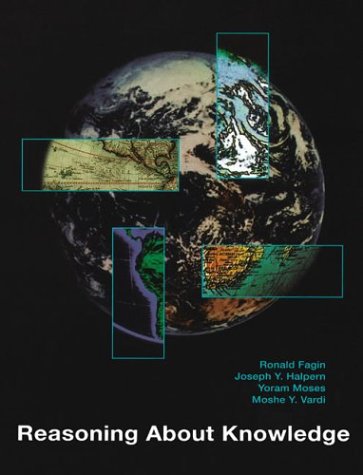Background
Halpern, Joseph Yehuda was born on May 29, 1953 in Tel Aviv. Son of Israel and Eva (Grosz) Halpern. came to the United States, 1977.



( Reasoning about knowledge--particularly the knowledge o...)
Reasoning about knowledge--particularly the knowledge of agents who reason about the world and each other's knowledge--was once the exclusive province of philosophers and puzzle solvers. More recently, this type of reasoning has been shown to play a key role in a surprising number of contexts, from understanding conversations to the analysis of distributed computer algorithms.Reasoning About Knowledge is the first book to provide a general discussion of approaches to reasoning about knowledge and its applications to distributed systems, artificial intelligence, and game theory. It brings eight years of work by the authors into a cohesive framework for understanding and analyzing reasoning about knowledge that is intuitive, mathematically well founded, useful in practice, and widely applicable. The book is almost completely self-contained and should be accessible to readers in a variety of disciplines, including computer science, artificial intelligence, linguistics, philosophy, cognitive science, and game theory. Each chapter includes exercises and bibliographic notes.
http://www.amazon.com/gp/product/0262562006/?tag=2022091-20

( Uncertainty is a fundamental and unavoidable feature of...)
Uncertainty is a fundamental and unavoidable feature of daily life; in order to deal with uncertaintly intelligently, we need to be able to represent it and reason about it. In this book, Joseph Halpern examines formal ways of representing uncertainty and considers various logics for reasoning about it. While the ideas presented are formalized in terms of definitions and theorems, the emphasis is on the philosophy of representing and reasoning about uncertainty; the material is accessible and relevant to researchers and students in many fields, including computer science, artificial intelligence, economics (particularly game theory), mathematics, philosophy, and statistics. Halpern begins by surveying possible formal systems for representing uncertainty, including probability measures, possibility measures, and plausibility measures. He considers the updating of beliefs based on changing information and the relation to Bayes' theorem; this leads to a discussion of qualitative, quantitative, and plausibilistic Bayesian networks. He considers not only the uncertainty of a single agent but also uncertainty in a multi-agent framework. Halpern then considers the formal logical systems for reasoning about uncertainty. He discusses knowledge and belief; default reasoning and the semantics of default; reasoning about counterfactuals, and combining probability and counterfactuals; belief revision; first-order modal logic; and statistics and beliefs. He includes a series of exercises at the end of each chapter.
http://www.amazon.com/gp/product/0262582597/?tag=2022091-20
engineer university professor computer scientist
Halpern, Joseph Yehuda was born on May 29, 1953 in Tel Aviv. Son of Israel and Eva (Grosz) Halpern. came to the United States, 1977.
Halpern graduated in 1975 from University of Toronto with a Bachelor of Surgery in mathematics. He went on to earn a Doctor of Philosophy in mathematics from Harvard University in 1981 under the supervision of Albert R. Meyer and Gerald Sacks.
Head mathematics department Bawku Secondary School, Ghana, 1975-1977. Teaching fellow Harvard University, Cambridge, Massachusetts, 1978—1980. Postdoctoral fellow Massachusetts Institute of Technology, 1981-1982.
Member research staff International Business Machines Corporation Almaden Research Center, San Jose, California, 1982—1996, manager mathematics and related computer science department, 1987-1989. Consulting professor Stanford University, Palo Alto, 1991—1996. Professor deputy computer science Cornell University, Ithaca, New York, since 1996, chairman deputy computer science.
Visiting professor Stanford University, 1984—1991, University Amsterdam, 2001—2002, Hebrew University, Jerusalem, 2002, Fulbright distinguished chair natural science and engineering, 2009—2010. Member National Research Council Army Research Laboratory Technology Assessment Board, 2005—2007.
( Reasoning about knowledge--particularly the knowledge o...)
( Uncertainty is a fundamental and unavoidable feature of...)
Fellow: American Association for the Advancement of Science, American Association Artificial Intelligence, Association Computing Machinery.
Married Gale Evelyn Jacobs, August 31, 1980.
